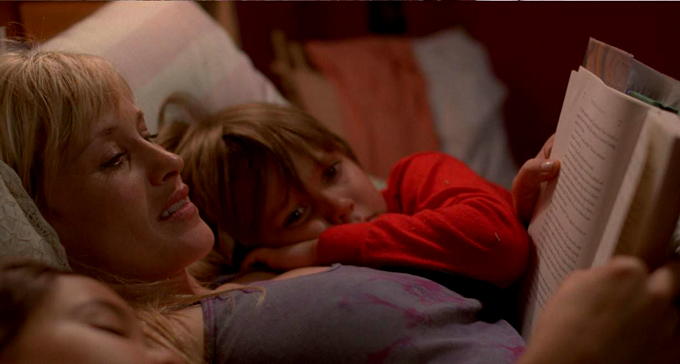The Texas pastoral Boyhood is a new film from Richard Linklater (Dazed and Confused, Before Sunrise), notable not for its subject matter but for how it was made. Or, more accurately, when it was made. Shot over 12 years, Boyhood captures the decade long adolescence of a young boy, along with his sister and parents, over an actual decade. Linklater and crew got together once a year to shoot the young actor, Ellar Coltrane as Mason, in small scenes from a boy’s life doubtlessly informed by Linklater’s own lone star childhood. Boyhood is nearly documentarian in nature, as Linklater contructs his film around the details and feel of growing up in the 00’s. While the film does not contain any bombastic epiphanies or the intense dialogue of past Linklater films, Boyhood captures the wandering spiral into adulthood that is sure to especially resonate for anyone who grew up or raised children during a particular American era.
 |
| Cue nostalgia/ancient hatred |
The principal action in Boyhood is to mark the passive passage of time. Most of the film is composed of regular events rather than milestones, although a few encounters stand out as particularly dramatic. We see Ellar riding bikes and working dishwasher jobs. Most major events, such as the first important breakup, are referred to rather than shown. When the minute hand does tick forward, expressed in the film as the yearly time jump, the cut often occurs at unremarkable moments. Patricia Arquette plays Mason’s mom, who balances maternal affection with her own individual needs. Linklater makes her intelligent, and successful but never able to quite grasp happiness. Late in the film, she divulges that she feels that her life has passed too quickly, counted off as a series of milestones. Boyhood seems to be an argument against this summation of life’s value. Several of the events that make up the texture of the film are not milestones counted off by Arquette here (or vice versa, not shown by the film). Many subtle events seem equally formative as obvious ones, such as hanging out in a construction site acting like idiots with friends. Linklater isn’t really in the business of spouting maudlin truisms though, as numerous characters and events emphasize the inability of people to control their choices and feelings. Linklater is telling us that life happens in the middle but it is unconscious and subliminal. The characters that grow satisfied with life in Boyhood achieve this only by hard sustained effort or aged wisdom.
The cumulative effect of this laze faire story telling is that the Boyhood slots into your life like memories. It feels like an extra decade appended to your life. One danger of this approach is that a story without story can become mired in the free-form miasma and lose your attention. Memories are raw material that are reshapened into the stories we tell. Perhaps to mitigate this issue, Boyhood has small hooks and appended quips that frame small portions of the film. Sexual remarks fly over Mason’s head for the first years of the movie, punctuated by a confused expression. Mason’s parents experience a lot of change which keeps the film going, even if this seems to only have a small effect on Mason. Similarly, cultural cache is used freely to mark the time period creating a game of spot the reference such as casually hearing the Flaming Lips on the radio mid-2000s. It’s well thought out production, but in spots it conflicts with the near documentary quality achieved by the film’s production. Boyhood is balanced at a crossroads; it actually documents the growth of a person but it also sews in small parables and reaction shots.
Perhaps this deliberate approach is crucial to structure the nearly three hours of film Linklater put together, but it does create distance between Mason the character and our own internal dialogue. This distance is not filled by the film, indeed Mason transitions from a quiet kid to a normal taciturn teenager and with next year right around the corner his character isn’t always given space to breath. Is it possible the viewpoint of Boyhood, which increasingly becomes a surface examination of events, may be parental? Linklater’s own daughter plays Mason’s approximately aged sister, and small details of Mason’s personality seem too precocious. The film doesn’t use a technical fixed viewpoint, spending time alone people other than Mason, but most of the runtime is devoted to interaction between him and his parents. Doubtlessly Linklater is not embarrassed of his biases, evidenced by the return of his longtime Before Sunset actors as parents, but it does seem that we are on the outside looking in (or down) at Mason. Therefore, Boyhood requires active empathy from the audience. Mason’s life is an echo chamber for our own thoughts on growing up. For people trained to find meaning in small actions and events and then write about it, Boyhood has been an enormous hit. If you don’t have attachment to the era or culture though, you may be wondering what the fuss is about.
 |
| They should have really learned the script before they hit the set |
If you manage some growing up in America, Boyhood is an at times devastatingly familiar look at the often unspoken details of adolescence. It is also largely surface, a polished sphere for reflection. The film is antithetical in approach and content to Malick’s Tree of Life, but in many ways these films are extremely alike. Does Linklater’s approach represent the ultimate form of capturing cinematic growth, requiring all future films to start decades in advance? Every other film suggests the answer is no; even during Boyhood the brain forgets that Mason and Ellar are co-developed. This is not because we lose sight of Ellar, but instead we believe so entirely in Mason the character that we internally establish continuity between him and time and would tolerate any reasonable facsimile that represents him. As Michael Haneke says, “Film is 24 lies per second in the service of truth.” We as the audience are used to this, and are so good at suspending disbelief that we don’t require ten years of truth for ten years of film. All of this doesn’t take away from Boyhood though, which is an intelligent well-made film. Linklater has capture many subtle parts of growing up which usually eschew description and locked them in this time-capsule. Boyhood will surely stand the test of time as a novel experiment with deft construction.
3/4
Originally published on Synthetic Error July 27, 2014


Comments
Post a Comment